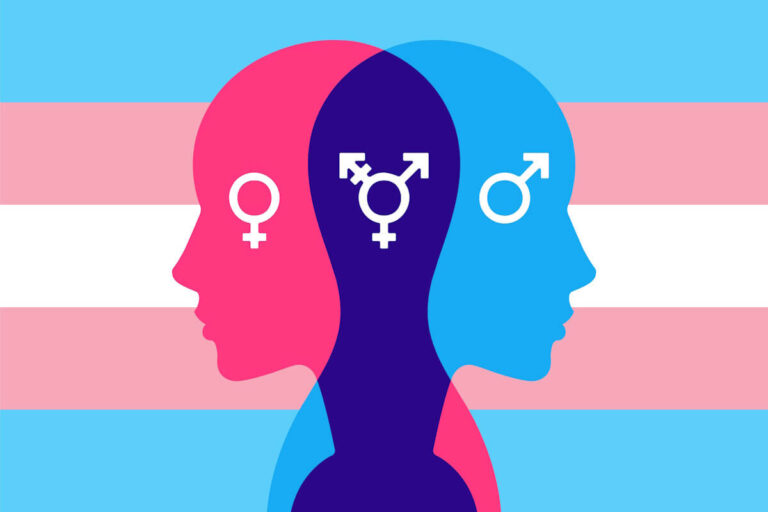We all have a unique gender identity, but it can be especially difficult for trans women to find acceptance and affirmation. Navigating the complexities of passing and expressing one’s gender identity can be daunting, and it can feel like an uphill battle. But it doesn’t have to be that way! With the right guidance and resources, trans women can achieve mastery over their gender identity. In this article, we’ll take a look at the complexities of passing and gender identity for trans women, and provide resources and advice on how to navigate the journey.
Let’s debunk the misconception that passing is impossible and celebrate trans women’s unique journeys.
Introduction to Passing and Gender Identity Struggles for Trans Women
For trans women, navigating gender identity and the desire to pass can bring with it unique struggles, but there are resources available to help make the journey easier. Passing as cisgender or being seen as the gender one identifies with can be a matter of safety, mental health, and validation.
However, the concept of passing is rooted in cisgender beauty standards that are often unfair and unattainable. Passing can also mean outing oneself as trans, which can be seen as both a source of pride and vulnerability.
Transitioning for trans women can involve a range of medical and social interventions, but hormone replacement therapy (HRT) is a key element. HRT is a way to reduce the production of testosterone in the body, which can result in physical changes such as breast development, softening of facial features, and redistribution of body fat.
It can also lead to mental health benefits like decreased anxiety and improved self-esteem. However, it’s important to remember that not all trans women choose to take hormones, and non-binary people can also benefit from HRT.
HRT can be a difficult decision, as it’s irreversible and carries potential risks. Therefore, it’s important to get the information, support, and resources needed to make an informed decision.
TransHub, an ACON platform, is a great resource for trans and gender-diverse people in NSW, their loved ones, allies, and health providers. It provides much-needed information, support, and services to help make the transition journey easier.

Hormone Replacement Therapy: A Key Element in Trans Women’s Transition
HRT's a primary part of transitioning for trans women, helping them express their gender in ways that feel right for 'em. Hormone replacement therapy, or HRT, is the process of replacing a person's existing hormones with those of the gender they identify with.
For trans women, this often means transitioning from male hormones to female hormones, like estrogen and progesterone. HRT can help reduce facial hair, smooth the skin, and contribute to passing as a female. While beauty standards should not dictate passing, they can be helpful in affirming one's gender identity.
Testosterone is a hormone that is naturally present at higher levels in males than females, and it plays an important role in the body. For trans women, testosterone can be a source of dysphoria, as it can cause facial hair growth, a deeper voice, and other masculine features.
HRT can help reduce the levels of testosterone in the body and create a more feminine appearance. This can be a source of gender euphoria for many trans women, as it helps them pass and feel more in tune with their gender identity.
The effects of HRT can vary for different people, and it can take some time to see results. But for many trans women, it's an essential part of their transition and a powerful tool for affirming their gender.
HRT can help reduce dysphoria, increase passing ability, and provide some emotional and mental relief. For many, it's an important part of their gender identity journey.
| Pro Tip: |
|---|
| Dive into the importance of using the correct pronouns with this insightful article on Why Using the Right Identity Pronouns Matter. Understand the significance of respecting and validating gender identity and fostering an inclusive and empathetic environment. |
The Role of Testosterone in Trans Women’s Gender Identity Journey
Testosterone is the driving force behind your gender journey, like a powerful engine that propels you forward and helps you reach your destination.
As a trans woman, it's important to understand the role of testosterone in your gender identity journey. Testosterone is a hormone that's naturally produced in the body of someone assigned male at birth, and it's thought to be responsible for the physical and psychological traits that are associated with being masculine.
For trans women, testosterone can be a source of gender dysphoria. Reducing testosterone levels can help alleviate gender dysphoria and help a trans woman pass as a cisgender woman. This can be done through hormone replacement therapy, which is a key element in a trans woman's transition.
Many trans women are interested in passing as cisgender women, which can be difficult to achieve without the help of testosterone-reducing therapies. For trans women, passing as a cisgender woman can be incredibly empowering and can be a source of gender euphoria.
However, it's important to remember that passing is not necessary for validation of one's gender identity, and that transness should not be made to fit cisgender concepts of beauty and identity.
Testosterone plays an important role in trans women's transition, but it's important to remember that gender expression should be a personal choice, not dictated by societal norms. Passing is not important to everyone, and many find joy in expressing themselves as masculine or feminine.
Ultimately, the beauty of transness lies in the shared stories, struggles, and strengths within the transgender community, and it's important to remember to be true to oneself.
Facial Hair Challenges: How Trans Women Overcome This Obstacle
Facial hair can be an intimidating challenge for trans women, but it doesn't have to be overwhelming. There are a variety of ways to address this issue, such as:
Temporary Solutions:
Shaving is a quick and easy way to temporarily remove facial hair, and it can be done as often as needed. However, it can cause skin irritation and it may take longer for the hair to grow back.
Waxing is another temporary solution that can last longer than shaving but may cause skin irritation and redness. Threading is a less painful alternative to waxing and can last longer.
Permanent Solutions:
Laser hair removal is a more permanent solution, as it can reduce or even eliminate facial hair. It is a costly procedure and can be painful but can also provide long-term relief. Electrolysis is a more permanent solution to facial hair removal that can be painful and costly.
No matter which option a trans woman chooses, it is important to remember that there is no pressure to pass and that everyone's journey is unique. Trans women should do what's best for them and not feel misgendered or like they have to try to pass.
From tucking to voice training and feminization, mastering the art of communication is an important part of any trans woman's journey.
| Pro Tip: |
|---|
| Embark on a journey to radiant skin with these essential Skincare Tips for Trans Women. Uncover expert advice on maintaining a healthy, glowing complexion tailored to the specific needs and concerns of trans women. |
Voice Training and Feminization: Mastering the Art of Communication
Do you want to learn how to communicate with confidence and present yourself as the beautiful person that you are? Voice training and feminization can help you achieve that goal!
Voice training and feminization can help trans women conform to the sound of a cis woman while also coming out as trans in their own unique way. This can provide a level of affirmation and self-acceptance that can be hard to come by in a world that doesn't always recognize or affirm trans identities.

Voice feminization can help trans women develop a range of vocal techniques that make their voices sound more feminine and attractive. This includes things like pitch, resonance, intonation, pronunciation, and even emotion. Learning to control these sounds can help trans women feel more confident in their bodies and their voices. It can also help them better express themselves in a way that is true to their gender identity.
Finally, voice feminization can be a vital part of creating a sense of safety and acceptance in the world. It can help trans women feel more confident when talking to people, and it can help them communicate their true gender identity without fear of judgment or rejection. With the right tools, trans women can learn to use their voices to affirm their identities and make their presence known.
Another vital aspect: Tucking techniques for passing as a trans woman.
Tucking Techniques: A Vital Aspect of Passing for Trans Women
Tucking can be an essential part of presenting as one's true self, allowing trans women to feel more confident and affirmed in their identity. Many cis people have never heard of tucking and might not understand the importance it holds for many transgender people.
Tucking is the process of pushing the testes and penis back into the body, making them less noticeable. It can be done in various ways depending on the individual and their needs, from using a compression garment to taping the area.
For those who have had gender-affirming surgery, tucking is no longer necessary. But for those who don't have access to or don't want to pursue cosmetic surgery, tucking can make a huge difference in how they present. Even for those who do have access to surgery, tucking can still be a great way to feel more comfortable in certain situations.
Tucking techniques can be used by trans men and non binary people who present as butch, as well as trans women. For some, it can be a way to express their gender identity more freely and confidently.
No matter how someone chooses to tuck, it is important that they understand the risks and how to safely tuck. It is also important to remember that there is no one way to look trans, and tucking should never be a requirement for someone to be valid in their gender identity.
Clothing and Style Choices: Dressing to Match One’s Gender Identity
Dressing to match one's true self can be a liberating experience, often likened to a butterfly emerging from its chrysalis. For trans women, being able to express one's person's gender through clothing and style choices is an important part of passing and living authentically. Whether it be masculine or feminine, it is crucial to feel comfortable and confident in whatever one chooses to wear.
Fashion is an incredibly powerful tool for self-expression and can have a profound impact on how we feel and how we are perceived. However, it's important to remember that passing isn't the end goal, but rather being true to oneself and one's gender identity.
Trans women should not be made to fit cisgender norms of beauty and identity. Instead, it's about creating a unique style that is reflective of one's true self.
Finding and using clothes to express one's gender identity can be an empowering experience. It's an opportunity to embrace and celebrate one's unique identity, even if it doesn't fit into traditional gender stereotypes.
Trans women should be able to wear whatever they feel most comfortable in without fear of judgment or ridicule. The beauty of transness lies in the shared struggles, strengths, and stories of the community, and that's something to be celebrated.
With the right clothing and style choices, trans women can find the confidence to express their identity in a way that's true to themselves.

Building Confidence: Tips for Overcoming Social and Emotional Barriers
Feeling comfortable and confident in your true self can be a challenge, but it's achievable with the right mindset and attitude. Here are some tips for transgender women to build their confidence when it comes to passing and their gender identity:
- Make a conscious effort to accept yourself as a man or a woman, regardless of what others think. You are valid, real, and worthy of respect.
- Spend time with supportive people who make you feel accepted and safe. Find other transgender and cisgender men who encourage your gender expression.
- Take steps to align your external presentation with your internal identity. This could include clothes, hairstyles, makeup, and voice modulation.
- Don't compare yourself to other transgender people. Everyone has a unique gender expression, and there's no right or wrong way to be transgender.
Passing isn't necessary for transgender people, but it's often a goal. Striving to pass can take an emotional toll on mental health. Remember that we're all individuals with unique gender expressions. No one should fit into cisgender beauty standards. Ultimately, feeling confident in your identity is the most important aspect of being a transgender woman.
| Pro Tip: |
|---|
| Discover the Top 13 Makeup Products for Trans Women that will enhance your beauty and boost your confidence. Explore expert recommendations for must-have items to create a stunning look that truly reflects your identity. |
The Emotional and Psychological Impact of Struggling to Pass
For many trans people, the struggle to pass as a cis person can be an emotionally and psychologically draining experience. It can be difficult to cope with the feeling of being outed or facing potential harassment and violence when presenting in a way that does not conform to societal norms. It can be hard to find the resources and self-help tools to make passing easier, especially when the standards for passing are often unattainable or not applicable to all trans people.
| Struggle | Impact |
|---|---|
| Fear of harassment and violence | Anxiety and stress |
| Feeling outed | Loss of confidence |
| Lack of resources | Feeling isolated |
| Unattainable standards | Low self-esteem |
The emotional and psychological impacts of struggling to pass can be devastating. It can lead to feelings of anxiety, stress, and fear when out in public. It can also cause a lack of confidence, feelings of isolation, and low self-esteem when faced with unattainable standards. For trans women, the fear of being outed as trans in public can be especially daunting. It can be hard to feel safe in a world where even the shape of a penis being pulled back can be a reason for suspicion.
The psychological stress of struggling to pass can be overwhelming. It is important for trans women to build a strong support system to cope with the emotional and psychological impacts of the struggle. This support system can be made up of friends, family, and other trans women who are navigating gender identity together. Having a safe space to talk about the struggles can help alleviate some of the emotional and psychological stress, and help build a sense of community and belonging.
Building a Support System: Trans Women Navigating Gender Identity Together
We understand that coming to terms with one's gender identity can be a complex and daunting process, especially when trying to pass as a cisgender person. However, trans women don't have to go through it alone.
Building a strong support system of friends, family, and other members of the trans community can be invaluable in navigating gender identity.
We can start by affirming existing relationships. Even if our family and friends may not fully understand our gender identity, they can still be valuable sources of support and acceptance.
We should also look for support groups, both online and in person, that can offer us a safe space to express our feelings and gain insight and advice from others in similar situations.
Finally, we can take advantage of resources like the ACON TransHub and other organizations that provide helpful information and resources for trans people.
Having a strong and reliable support network can make a big difference in our journey to acceptance and self-love. Together, we can work to create a world where trans women are accepted by society, are safe, and can express their gender identity in whatever way feels right for them.
| Pro Tip: |
|---|
| Master the art of everyday makeup with this informative guide on Makeup for Trans Women: Create an Everyday Look. Learn valuable tips and techniques to achieve a natural, flawless appearance that complements your unique style. |
Legal Matters: Name and Gender Marker Changes for Trans Women

Navigating the legal system can be a complicated process for trans women, but making name and gender marker changes can help them feel more affirmed and secure in their identity. While these changes may not impact how others view them, they can make a big difference in how trans women view themselves.
Name changes can vary from state to state, but typically require a court order. Some states may require a doctor's note or a letter of recommendation from a therapist in order to change one's name.
Once the paperwork is filed, the court will decide whether to approve the name change and issue a court order. Once the court order is issued, the name can be changed on documents like a driver's license, passport, and birth certificate.
Gender marker changes can also be a complicated process, but can help trans women to feel more affirmed. Depending on the state, the process can vary but usually will require a letter from a doctor or therapist. Some states may also require a court order before changing the gender marker on documents. It is important to note that some states may also require evidence of gender-affirming medical treatments.
Making name and gender marker changes is important for trans women to feel affirmed, but it is important to remember that these changes are not always necessary or possible. It is important to ensure that trans women have the resources and support they need to make the best decisions for themselves.
See Also: Resources for Trans Women Seeking Guidance on Passing and Gender Identity
For those seeking to affirm their identity, understanding the complexities and nuances of passing and exploring their gender can be overwhelming; thankfully, there are plenty of resources to help make the process more manageable.
Trans women may find that the journey to passing and understanding their gender identity can be both difficult and liberating. The internet provides a wealth of information to help trans women sort through the complexities of passing and gender identity. From blogs to forums, trans women can find support from others who have gone through similar experiences.
Organizations such as ACON and TransHub are also available to help trans women navigate the legal aspects of name and gender marker changes. In addition, they provide resources and support to those seeking to explore their gender identity. From online counseling and support groups to legal advice and medical services, these organizations are dedicated to helping trans women feel empowered and supported.
Finally, for the trans women for whom passing is not an option, there are still ways to embrace and celebrate their unique gender identity journeys. Whether it’s through creative expression, activism, or simply being true to oneself, there is no wrong way to be trans.
There are also countless ways to combat the harmful effects of misgendering and harassment, and to create a safe, supportive space for trans women to thrive.
| Pro Tip: |
|---|
| Ready to find love and companionship? Explore My Transgender Cupid, a dedicated platform for trans dating. Connect with like-minded individuals who celebrate and appreciate your unique journey toward self-discovery and happiness. |
Conclusion: Embracing and Celebrating Trans Women’s Unique Gender Identity Journeys
You don't need to pass to be valid or wonderful, but embracing your own unique gender identity journey can be incredibly empowering and liberating.
The transgender community has long been denied the right to exist and has had to fight for its place in society, but now more and more people are being accepted and celebrated for who they are. While some trans people may have a desire to pass, for many it is a complicated and difficult process that depends on a variety of factors such as financial ability, access to gender-affirming medical care, genetic background, societal standards of beauty, and who is doing the reading.
At the end of the day, it's important to remember that no matter how a person is perceived or accepted by society, what matters most is that they are being true to themselves.
Everyone's gender identity journey is different, and it's important to honor and celebrate the unique and diverse experiences of the transgender community.
Here are some things to remember when embracing your gender identity:
- You don't need to pass to be valid or accepted.
- Gender expression should be a personal choice, and not dictated by societal expectations.
- Everyone's gender identity journey is unique and should be celebrated.
- Transness should not be made to fit cisgender concepts of beauty and identity.
- Being true to yourself is the most important aspect of being trans.
Trans people have had to fight for acceptance, visibility, and recognition for so long, and it's time for us to come together and celebrate our unique gender identity journeys.
No one should be judged, shamed, or pressured to conform to a certain notion of beauty or gender expression. It's time to accept, embrace, and celebrate trans people in all their glorious, diverse forms.
How do I pass as a trans woman?
There are several ways you can work to pass as a trans woman. As it’s based on presentation, the way you present yourself helps. There are simple options such as facial feminization makeup or wearing feminine clothing. You can also go through HRT, which will shift weight in your body to give you a more feminine appearance. There is also vocal training for trans women. Vocal training is a set of lessons to make your voice more feminine.
What if I don’t want to pass as a trans woman?
Then don’t. While some trans women want to pass, others don’t at all. And that’s okay. If you decide that you’re a trans woman who doesn’t care about working to pass, you’re still a trans woman. You can do anything with your appearance and still be the person that you are.
How can you tell if a transgender person is passing or not?
It's important to note that "passing" is subjective and can vary depending on the individual and the context. However, some common signs that a transgender person may be passing include their physical appearance (such as their clothing, hairstyle, and makeup), their voice and mannerisms, and how they interact with others.
Are there binary trans women who don’t care much about passing?
Yes, there are definitely binary trans women who do not prioritize passing as a goal in their transition. Each individual's experience of their gender identity and their goals for their transition are unique, and not all trans women feel that passing is essential to their well-being or sense of self.
What do passing trans women think about non-passing trans women?
Again, this can vary depending on the individual. However, it's important to note that just because a trans woman is passing doesn't mean that she is more valid or "better" than a non-passing trans woman. Passing can be a privilege that is not accessible to all trans individuals, and it's important for us to support and uplift all members of the trans community, regardless of their ability to pass.
What is it like dating as a non-passing trans woman?
Dating can be challenging for any trans individual, but non-passing trans women may face additional obstacles in finding partners who are respectful and affirming of their gender identity. It's important for potential partners to be accepting and supportive of a non-passing trans woman's identity, and to prioritize communication and consent in any romantic or sexual interactions.




